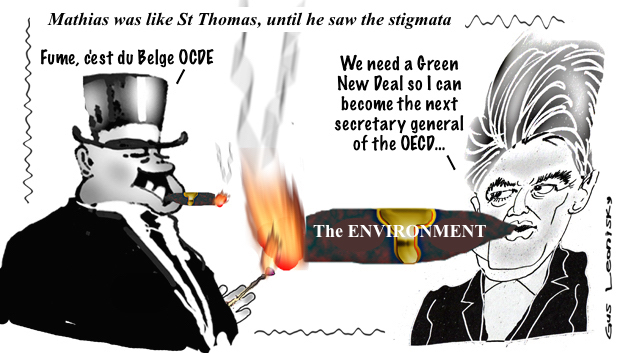Search
Recent comments
- ukraine's agony has not started yet....
11 hours 59 min ago - all defeated.....
12 hours 11 min ago - beyond crime.....
13 hours 1 min ago - the end....
13 hours 12 min ago - odessa....
14 hours 19 min ago - weitz....
16 hours 9 min ago - bidenomics BS.....
16 hours 23 min ago - the defeat of ukraine is coming....
17 hours 11 min ago - paris is sick....
1 day 4 hours ago - German spies?....
1 day 5 hours ago
Democracy Links
Member's Off-site Blogs
or the writing on the wall...

Does a late conversion somehow void the finance minister’s previous statements and the Coalition’s decade of shame?
The window for attaining net zero emissions by 2050 and holding temperature increases to safe levels is “rapidly closing”. Evidence is mounting that the world is closer to abrupt and irreversible changes, “so-called tipping points”, than previously thought. Without further action to reduce greenhouse gas emissions, “the planet is on course to reach temperatures not seen in millions of years, with potentially catastrophic implications”.
This commentary is not from the annual general meeting of the Wild-Eyed Leftists Association, or the board minutes from the Suspicious Progressives Cooperative of Lower Bermagui. It’s from the International Monetary Fund, a fortnight ago, in the World Economic Outlook.
Deeply depressing, obviously. But rather than plunging us all into existential anxiety, the IMF presented a plan, and the plan was a green recovery from the coronavirus-induced global recession.
A combination of carbon pricing and an “initial green stimulus” would turbocharge recovery, put the global economy on a sustainable growth path post-pandemic, at the same time dealing with a problem escalating dangerously on our watch. The suggested policy architecture was a carbon pricing regime that compensated households, subsidies for renewable energy production, and a 10-year green public investment program.
These ideas probably sound familiar, because Australians have seen them in action.
The Gillard government legislated a similar framework in the 43rd parliament before Tony Abbott rebranded the package a “carbon tax”, and proceeded to drive a riven Labor government out of office. Peta Credlin, Abbott’s then chief of staff, later reflected: “It wasn’t a carbon tax, as you know … but we made it a carbon tax. We made it a fight about the hip pocket and not about the environment. That was brutal retail politics and it took Abbott about six months to cut through and, when he cut through, Gillard was gone.”
So let’s summarise what’s happened: Australia had a viable policy framework to execute a transition that is both necessary and increasingly urgent, and that framework is gone, because the Coalition in 2013 persuaded a majority of people to elect Abbott to repeal a “carbon tax” that didn’t exist.
That’s where we are.
It’s a bin fire folks.
Emerging from this bin fire requires two things: being honest about what has happened, and learning from that failure.
Read more:
- By Gus Leonisky at 24 Oct 2020 - 10:57am
- Gus Leonisky's blog
- Login or register to post comments
not flying green with mathias...
Mathias Cormann’s travel around Europe to campaign for the top OECD job may be costing Australian taxpayers as much as $4,300 an hour, based on records of previous flights by the same type of air force plane that he is using.
The Morrison government is backing the former Australian finance minister’s bid to become the secretary general of the Paris-based Organisation for Economic Co-operation and Development but his prospects will depend on his appeal to European nations.
Cormann, who quit the Senate earlier this month, is travelling around Europe on a Royal Australian Air Force Falcon as part of his campaign, the Nine newspapers have reported.
The Dassault Falcon 7X special purpose aircraft, part of the RAAF fleet since early 2019, has a range of up to 11,000km. Defence says the Falcon usually has a crew of two pilots and one attendant, and can carry up to 14 passengers.
Sources familiar with RAAF travel arrangements pointed Guardian Australia to recent records of special purpose flights, which are commonly used to fly ministers and dignitaries around Australia including to attend parliament.
Records from the final six months of 2019 indicate flying the Dassault Falcon 7X comes at a cost of $4,305 a flying hour.
That suggests a return trip between Australia and Europe could cost more than $100,000, plus the cost of any internal flights within Europe.
Guardian Australia asked defence’s media unit to confirm the use of RAAF assets for the Cormann campaign, the costs incurred to date and any expected future provisions. It said it was working on a response.
The Department of Foreign Affairs and Trade is yet to respond to questions regarding how much has been budgeted for Cormann’s campaign, given the government has set up a website and is likely to be providing support through embassies across Europe.
Read more:
https://www.theguardian.com/australia-news/2020/nov/24/flights-for-mathias-cormanns-european-campaign-for-oecd-job-could-cost-taxpayers-4300-an-hour
Full of his self-importance and pedalling with green-hypocrisy...